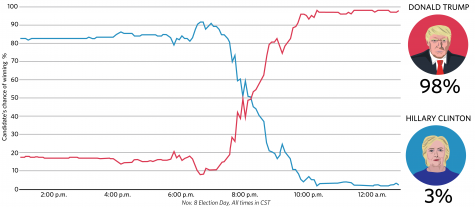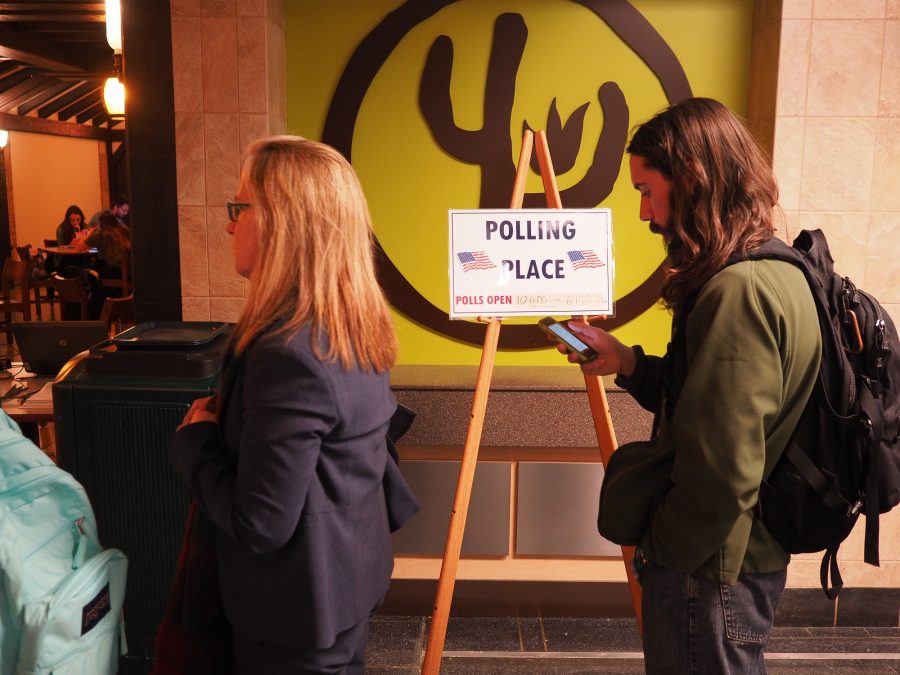University startup correctly predicts Trump, Brexit
Students line up for early voting in the Illini Union basement.
Nov 28, 2016
Last updated on Nov. 29, 2016 at 06:36 p.m.

In the wake of Donald J. Trump’s victory in the presidential election, voters and pundits alike wondered the same thing, how could Trump have pulled off such a massive upset over his seemingly heavily favored opponent, Hillary Clinton.
Nearly every poll had Clinton winning most swing states along with the national election — nearly every poll was wrong. On the morning of Nov. 8, the University’s own Election Analytics group gave Trump a mere 0.20 percent chance of winning; in October, they gave him a zero percent chance.
Professor Sheldon Jacobson of Election Analytics said the polls missed multiple things, such as the number of undecided voters.
“We have seen in previous elections that the undecided would be down to two or three percent (by election day,)” Jacobson said. “In some states, they were as high as seven or eight percent, which was quite frankly, unheard of.”
Get The Daily Illini in your inbox!
Most undecided voters then flocked to the Republican candidate, Jacobson said. He pointed out that while most polls grossly underestimated Trump’s turnout, they managed to predict the number of Clinton voters quite accurately.
Jacobson also speculated that the discrepancy between the polls and reality were the many “quiet Trump supporters.” These voters did not answer polls honestly about who they would vote for, thus completely throwing off most polls.
Jacobson said this is one of the biggest flaws in current polling methods.
“The polling data was limited because it can only rely on what people tell them,” he said. “But if people were uncomfortable admitting that they were voting for Trump, what happened was the situation that we ended up with.”
While polling is a flawed method of data collection, Jacobson said it is the best one available. He believes no one has yet come up with a more reliable method to predict elections.
But a University startup thinks it has the answer to this dilemma. The company, called Tweetsense, managed to predict both Trump’s victory and Brexit, the United Kingdom’s vote in June to leave the European Union.
Tweetsense claims it is the only group on the planet to correctly predict the Chicago mayoral election, Brexit and Trump’s victory.
William Widjaja and Cody Pawlowski, sophomores in Engineering, founded the startup in 2015. The platform works by reading through news posts, tweets and other sources to determine people’s “sentiment” about a topic.
“We then make correlations between that and future events,” Pawlowski said. “We found that it’s a great way of making predictions, as shown by our Brexit and U.S. election predictions.”
“It’s a search engine for people’s opinions, essentially,” Widjaja added.
Widjaja and Pawlowski said that this “sentiment analysis” is significantly more accurate than traditional polling methods because of better sampling. Using social media allows them to survey a larger number of people more often than polling does, ultimately leading to more accurate data.
The two of them were incredibly surprised when their system’s seemingly insane predictions came true — twice. Pawlowski said they were shocked when Brexit ended up happening, and were again blown away by Trump’s victory. Widjaja felt similarly, but managed to find a silver lining.
“I gotta say, I was happy,” Widjaja said. “A lot of other people seemed to be devastated, and then the two of us were sort of just smiling.”
Because of its success, Tweetsense now has a unique opportunity to monetize its services. Widjaja and Pawlowski hope to secure a lucrative contract with politicians across the country.
“By the end of 2017, we pretty much want to get every politician in Illinois signed up, and in 2018 we want to get all of Congress signed up,” Widjaja said. “And the reason we’re going for this seemingly narrow space of just a handful of politicians is because we’re pretty much the only company that can.”
Despite Tweetsense’s success, Professor Jacobson remained skeptical of using social media analysis instead of traditional polling methods. He said it remains to be seen whether it will stand the test of time.
“If you hit a homerun at your first at-bat, it looks like you’re now going to hit a home run forever,” Jacobson said. “And there may be some truth to what they’re doing, I don’t know. One has to validate the methodologies over time to determine exactly what’s going to happen.”
Jacobson said that websites like Election Analytics or FiveThirtyEight have sound algorithms and shouldn’t be discounted just yet due to their failures in 2016. Both websites did present scenarios that, although unlikely, allowed Trump to win the White House.
“In this particular case, the rarest forecast turned out to be correct,” Jacobson said. “But how do you predict that in the future? The fact is, I can’t predict the future. I don’t think anybody can.”






